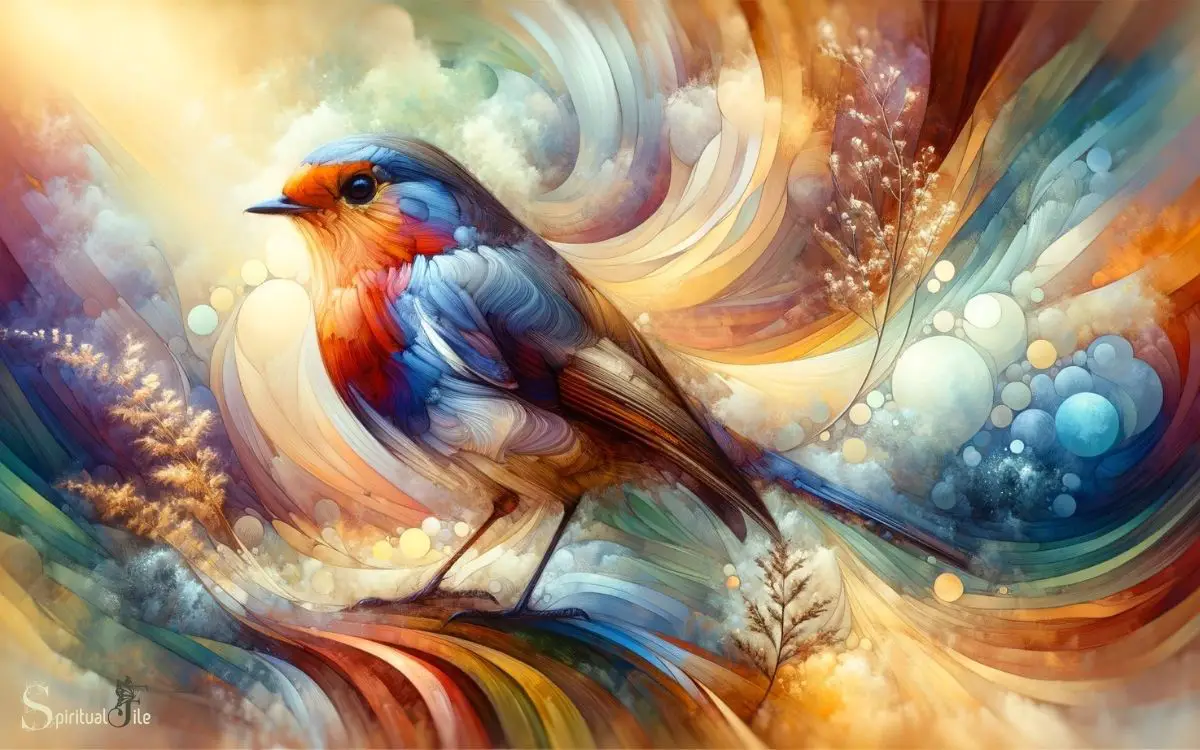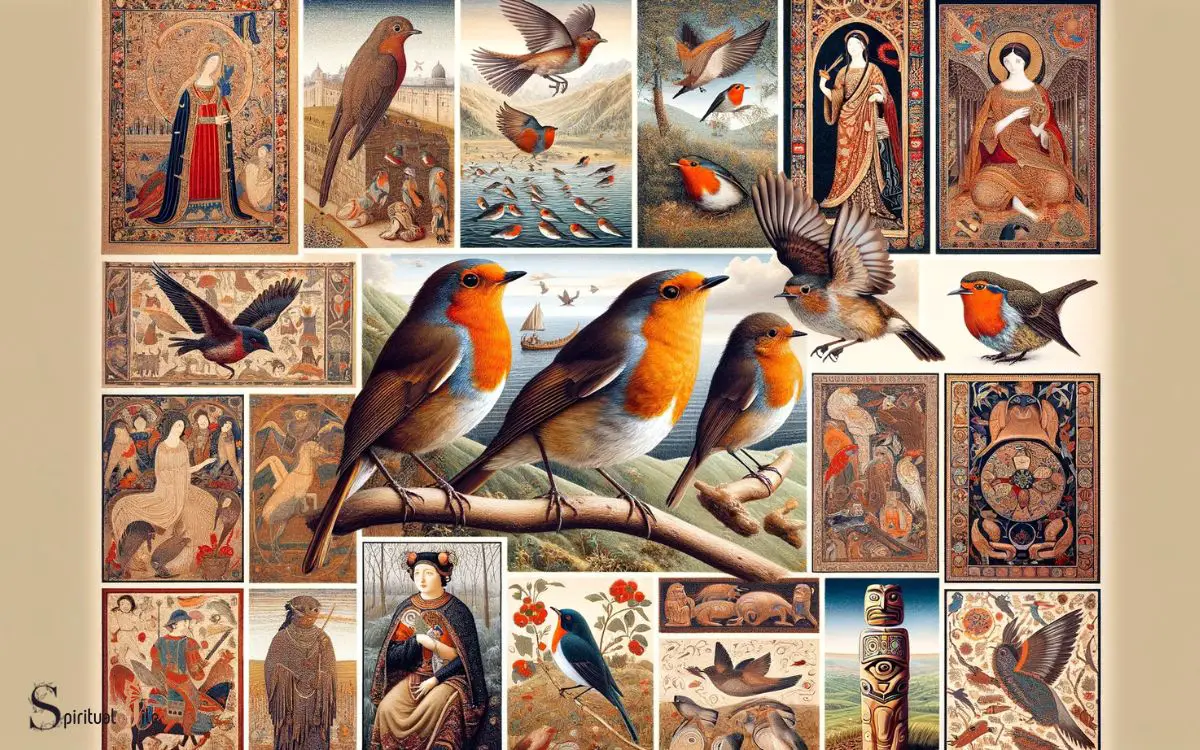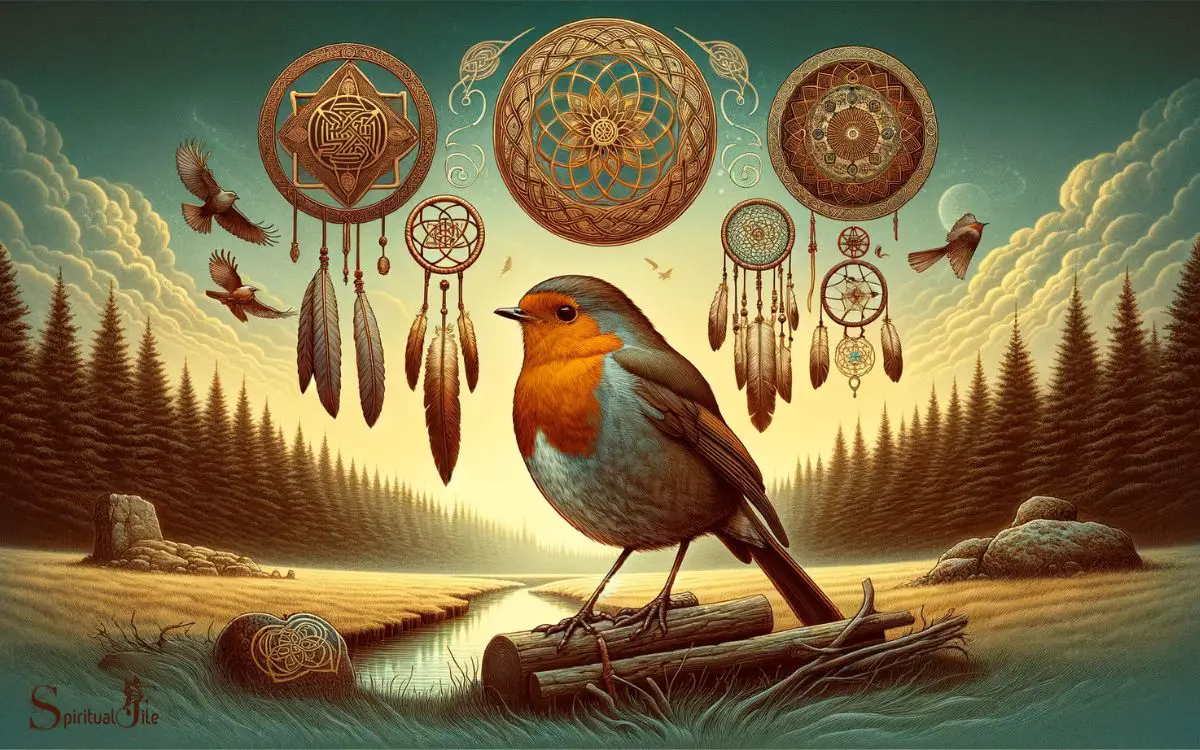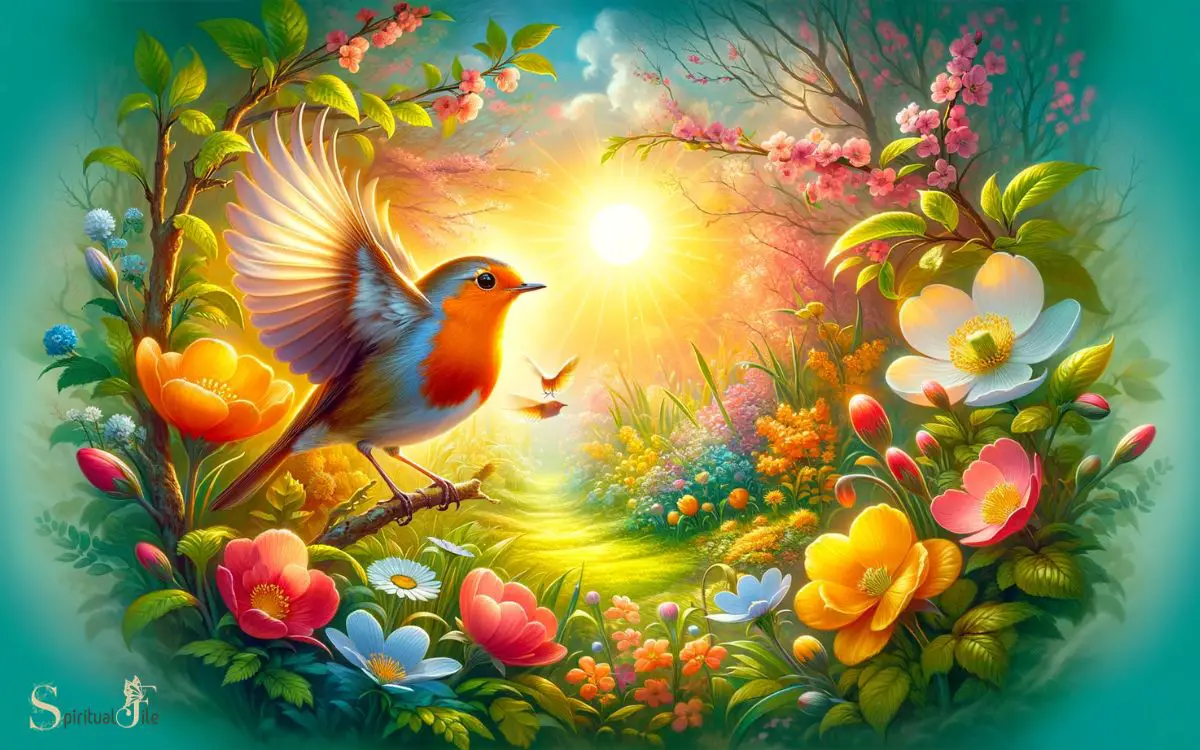What Do Robins Symbolize Spiritually? Joy!
Robins spiritually symbolize new beginnings, hope, and joy. They are often seen as a sign of spring, representing rebirth and renewal. The sight of a robin is commonly interpreted as a message of optimism and the importance of perseverance.
In spiritual terms, the robin is cherished for its symbolic meanings across various cultures.
For example:
- In Native American cultures, robins are seen as a symbol of change and growth.
- In Christian lore, the robin’s red breast is linked to Christ’s suffering, thus symbolizing sacrifice and passion.
- In European folklore, robins are associated with good luck and are believed to possess a connection to the spirit world.
Robins are also thought to represent:
- Transformation, as their arrival signifies the transition from winter to spring.
- The power of new beginnings, since they are among the first birds to sing at dawn.
- Joy and happiness, as their cheerful song is believed to uplift the spirit.
The robin, with its vibrant red chest and melodic song, serves as a beacon of hope, reminding us of the continuous cycle of life and the promise of brighter days ahead.
In the realm of spiritual symbolism, robins are highly regarded as symbols of new beginnings, hope, and the joy of life.
These birds are often associated with the coming of spring, which signifies rebirth and renewal in many cultures.

Key Takeaway
Spiritual Significances of Robins: Symbolism and Meanings
| Aspect of Symbolism | Meaning |
|---|---|
| General Symbolism | Renewal, Spring, New Beginnings, Hope |
| Spiritual Messenger | Communication between the spiritual and physical worlds |
| Transformation | Personal growth, Change, Evolution |
| Joy and Happiness | The presence of joy, the embodiment of happiness |
| Passion and Vigor | Strong emotion, zest for life |
| Fertility and New Life | Abundance, the start of something new |
| Guidance | Spiritual navigation, finding direction in life |
| Death and Rebirth | End of one phase, beginning of another |
Historical and Cultural Significance

While the spiritual symbolism of robins has evolved over time, their historical and cultural significance can be traced back to ancient folklore and religious beliefs.
- In European folklore, robins were often associated with the renewal of life and the coming of spring. They were seen as symbols of hope, rejuvenation, and new beginnings.
- In Christian traditions, the robin red-breast was believed to have acquired its distinctive color from the blood of Jesus Christ, and therefore, it became a symbol of sacrifice and resurrection.
- In Native American cultures, robins were revered for their melodious songs and were seen as messengers of joy and happiness.
Understanding the historical and cultural significance of robins provides a foundation for appreciating their spiritual symbolism in different traditions.
This lays the groundwork for exploring the diverse interpretations and meanings associated with robins in various spiritual contexts.
Spiritual Symbolism in Different Traditions

The spiritual symbolism of robins is rich and varied across different traditions. In Christianity, the robin is often associated with renewal and new beginnings, symbolizing hope and the resurrection.
In Native beliefs, the robin might be seen as a messenger, carrying important messages from the spiritual realm.
These different interpretations offer a fascinating insight into the diverse spiritual significance of robins in various cultural and religious contexts.
Robins in Christianity
In Christian symbolism, robins are often associated with the divine qualities of hope and renewal, representing the promise of new beginnings and spiritual transformation.
The red breast of the robin is sometimes linked to the blood of Christ, signifying sacrifice and redemption.
In Christian tradition, the robin’s presence is believed to bring messages of encouragement and guidance, particularly during challenging times.
The bird’s melodious song is seen as a symbol of praise and thanksgiving, reflecting a joyful heart and a sense of gratitude for God’s blessings.
Additionally, the robin’s ability to thrive in various environments is seen as a testament to the resilience and adaptability required in the Christian faith.
Overall, the robin holds a significant place in Christian spirituality, embodying themes of faith, resilience, and the promise of spiritual renewal.
Robins in Native Beliefs
Robins play a significant role in various Native beliefs, embodying spiritual symbolism across different traditions.
In Native American folklore, the robin is often associated with renewal, rebirth, and new beginnings. The bright red breast of the robin is seen as a symbol of the rising sun and the passion of life.
Among some Native tribes, the robin is believed to be a messenger that brings important teachings and helps humans connect with the spiritual realm.
In Indigenous cultures, the robin’s song is considered a sign of good fortune and a message from the spirit world.
Additionally, the presence of robins is often interpreted as a reminder to remain grounded and connected to the natural world, emphasizing the importance of living in harmony with nature.
Connection to Rebirth and Renewal

Often associated with the concept of rebirth and renewal, robins hold spiritual significance in many cultures and belief systems.
The robin’s connection to rebirth and renewal stems from its role as a herald of spring, a time of rejuvenation and new beginnings in the natural world.
In various spiritual traditions, the robin’s arrival is seen as a symbol of hope and the promise of new opportunities.
Its vibrant red breast is often interpreted as representing the vitality and life-giving energy associated with the sunrise and the dawn of a new day.
Additionally, the robin’s ability to build sturdy nests and raise multiple broods throughout the breeding season further emphasizes its association with renewal and the cycle of life.
The Robin as a Messenger of Joy

The robin’s role as a messenger of joy is further emphasized through its cheerful song, which resonates with many as a symbol of hope and happiness.
Its melodious warbling is often associated with the arrival of spring, a time of renewal and new beginnings.
In various cultures, the robin’s song is seen as a sign of good fortune and positive outcomes. The vibrant red breast of the robin is also linked to feelings of joy and vitality. Observing these birds flitting about in gardens or parks can elicit a sense of delight and optimism.
Moreover, the presence of robins is commonly believed to herald the fulfillment of wishes and the manifestation of positive changes.
Their presence can serve as a gentle reminder to find joy in the present moment and to embrace life’s blessings.
Symbolic Meaning of Robin’s Egg Blue

The symbolic meaning of Robin’s egg blue holds significant spiritual connotations. The color blue has long been associated with spirituality and divine energy, often representing tranquility, wisdom, and inner peace.
When it comes to the specific shade of Robin’s egg blue, the symbolism extends to new beginnings, fertility, and the renewal of life, making it a powerful symbol in various spiritual contexts.
Spiritual Significance of Blue
With a rich and calming hue, robin’s egg blue holds spiritual significance as a color that represents tranquility and inner peace.
In the realm of spirituality, the color blue, particularly reminiscent of a robin’s egg, carries a deep symbolic meaning that resonates with many individuals.
Here are four significant spiritual meanings associated with the color blue:
- Divine Connection: Blue is often linked to the spiritual realm, symbolizing a connection to the divine and higher consciousness.
- Healing and Serenity: This color is thought to promote feelings of calmness, peacefulness, and emotional healing.
- Communication: Blue is associated with clear and effective communication, both in expressing oneself and in receiving messages from the spiritual realm.
- Trust and Faith: It represents trust, faith, and devotion, serving as a reminder to have confidence in one’s spiritual journey and beliefs.
Robin’s Egg Symbolism
Symbolically, robin’s egg blue embodies a sense of tranquility and spiritual connection, carrying profound significance in various cultural and spiritual contexts.
The delicate hue of robin’s egg blue is often associated with renewal, growth, and new beginnings.
In many spiritual traditions, this color represents a sense of peace and calm, evoking feelings of serenity and inner harmony.
The robin’s egg blue is also linked to the throat chakra, symbolizing communication, truth, and self-expression. Its presence in nature, as seen in the eggs laid by robins, signifies nurturing and the cycle of life.
This color is revered for its ability to soothe the mind and uplift the spirit, serving as a gentle reminder of the interconnectedness between the physical and spiritual realms.
Color and Spirituality
In spiritual symbolism, robin’s egg blue embodies a sense of tranquility and spiritual connection, holding profound significance in various cultural and spiritual contexts.
The symbolic meaning of robin’s egg blue includes:
- Tranquility: The color represents a peaceful and calming presence, evoking a sense of serenity and harmony in spiritual practices.
- Renewal: It symbolizes new beginnings and fresh opportunities, often associated with spiritual growth and transformation.
- Protection: In some belief systems, robin’s egg blue is linked to protective energies, offering a shield against negative influences and promoting a safe spiritual environment.
- Communication: This color is also associated with clear communication and expression, encouraging open and honest dialogue in spiritual connections and relationships.
The symbolic significance of robin’s egg blue extends across various spiritual traditions, reflecting its universal appeal in conveying profound spiritual meanings.
Are there any spiritual meanings or symbolism associated with Robins and Squirrels?
Robins are often seen as a symbol of new beginnings and renewal in various spiritual traditions. Similarly, squirrels are associated with balance and resourcefulness. In Native American folklore, they are seen as messengers and bringers of good luck. Both animals carry deep spiritual meanings that have been revered for centuries.
Embracing Hope and Resilience

Embracing hope and resilience is essential for individuals seeking spiritual guidance and strength. The symbolism of robins in spiritual contexts often revolves around these themes.
The robin, often associated with the arrival of spring, signifies renewal, growth, and the endurance of harsh conditions.
In the same way, embracing hope allows individuals to find the strength to endure challenges and emerge stronger.
Resilience, a trait embodied by the robin’s ability to adapt and thrive, encourages individuals to persevere in the face of adversity.
The spiritual significance of robins reminds us to hold onto hope, even in difficult times, and to cultivate resilience in our spirits.
By embodying these qualities, individuals can find comfort and inspiration, knowing that they have the inner strength to weather any storm.
Conclusion
The spiritual symbolism of robins spans across various cultures and traditions, representing rebirth, renewal, and joy. The robin’s egg blue color symbolizes hope and resilience, while the bird itself is seen as a messenger of joy.
Across history, robins have held a deep spiritual significance, inspiring hope and optimism in the face of adversity. Their presence reminds us to embrace the beauty of renewal and the enduring power of hope.






